| Hospital de la Caridad | |
|---|---|
 Facade of the Hospital de la Caridad | |
| Geography | |
| Location | Seville, Spain |
| Coordinates | 37°23′03″N 5°59′44″W / 37.38417°N 5.99556°W |
| Organisation | |
| Type | Charity hospital |
| History | |
| Opened | 1674 |
| Links | |
| Lists | Hospitals in Spain |
The Hospital de la Caridad in Seville, Spain is a baroque charity hospital building near Plaza de toros de la Real Maestranza de Caballería de Sevilla. The charity hospital was founded in 1674, and still cares for the aged and infirm. The hospital's chapel is open to the public and "contains some of Seville's most sumptuous baroque sculpture."[1] Bartolomé Esteban Murillo in 1668 painted eight paintings commissioned for Seville's Hermandad de la Caridad, to which the artist himself belonged and one of whose commandments was to clothe the naked. Four of those eight works remain in Seville (The Miracle of the Loaves and Fishes, Moses at the Rock of Horeb, Saint Elizabeth of Hungary [returned to Spain 1815] and Saint John of God Carrying a Sick Man), whereas the Washington work and the other three were looted by Napoleonic commander and Marechal Nicolas Jean-de-Dieu Soult in 1810 (The Healing of the Paralytic, National Gallery, London; Abraham Receiving the Three Angels, National Gallery of Canada; The Liberation of Saint Peter, Hermitage Museum).[2][3]
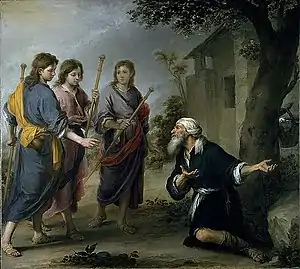 Abraham and the Three Angels (c. 1670-1674)
Abraham and the Three Angels (c. 1670-1674)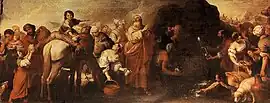 Moses at the Rock of Horeb
Moses at the Rock of Horeb_-_The_Miracle_of_the_Loaves_and_the_Fishes_-_NG_2796_-_National_Galleries_of_Scotland.jpg.webp) The Miracle of the Loaves and Fishes (c. 1667-1682) Copy Study in the National Galleries of Scotland for the original "The Miracle of the Loaves and Fishes "1669-1670" or "1670–1674"
The Miracle of the Loaves and Fishes (c. 1667-1682) Copy Study in the National Galleries of Scotland for the original "The Miracle of the Loaves and Fishes "1669-1670" or "1670–1674" The Return of the Prodigal Son (c. 1667-1670)
The Return of the Prodigal Son (c. 1667-1670)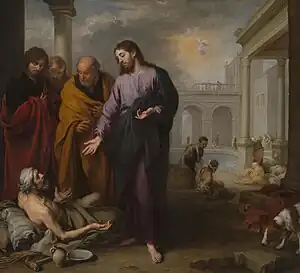 Christ Healing the Paralytic at the Pool of Bethesda (1667-1670)
Christ Healing the Paralytic at the Pool of Bethesda (1667-1670)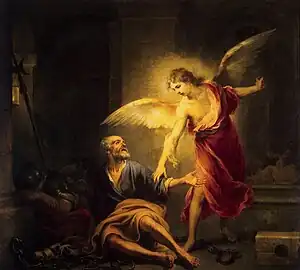 Liberation of Peter (1665-1667)
Liberation of Peter (1665-1667)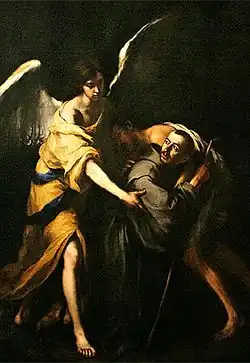 Saint John of God Carrying a Sick Man (1672)
Saint John of God Carrying a Sick Man (1672)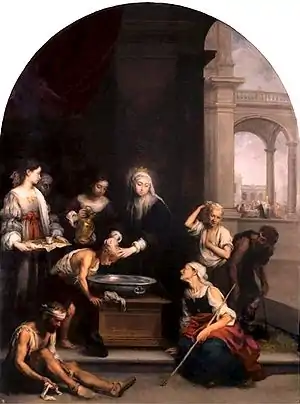 Saint Elizabeth of Hungary Curing the Sick (1672)
Saint Elizabeth of Hungary Curing the Sick (1672)
References
- ↑ Frommer's Seville Day by Day Jeremy Head - 2008 -p18 "Hospital de la Caridad. Founded in 1674, this charity hospital still cares for the elderly and infirm as it has always done, but it's the hospital's church which is worth a stop. It contains some of Seville's most sumptuous baroque sculpture and ..."
- ↑ (in Spanish) "El Prado restaura "San Juan de Dios", una de las ocho obras de Murillo para la Hermandad de la Santa Caridad sevillana".
- ↑ Martin Gayford. Please May We Have Our Swastika Picture Back? January 17, 2007